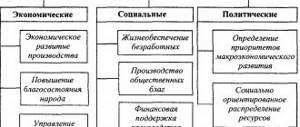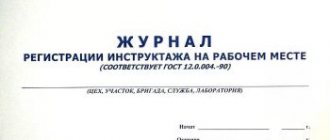Fulfillment of official duties is the responsibility of the employee
When applying for a job, the employee agrees to perform the work for which he was invited and understands that he will be responsible for failure to fulfill official duties. Before concluding an employment contract, he gets acquainted with his job description, internal labor regulations and other local acts relating to the performance of his labor function (Article 68 of the Labor Code of the Russian Federation), and signs that he has studied the documents and agrees with them.
The job description must detail his responsibilities at the workplace, the level of responsibility and the subordination structure. Correctly drawn up instructions can prevent many problems for the HR department in the future. Therefore, the drafting of this document must be approached very responsibly and the responsibilities must be listed in as much detail as possible, as in the fragment of the instructions for the cargo acceptor.
Meaning of job description
The work job description is formed to specify the functional responsibilities of the organization. It assumes:
- optimal and fair distribution of a set of functions among employees;
- ensuring the appropriate level and timeliness of implemented tasks;
- creating a favorable socio-psychological environment in the team of employees;
- preventing conflict situations;
- creation of a coherent work system and established communications between employees and departments;
- clear descriptions of employee rights;
- increasing collective and personal effectiveness and responsibility;
- introduction of methods of material and non-material incentives for employees;
- ensuring a uniform workload for workers.
Common Disorders
A complete list of violations that may result in disciplinary measures up to and including dismissal are listed in Art. 81 Labor Code of the Russian Federation. Let us highlight the main cases that occur in practice:
- improper performance of job duties due to the absence of an employee, that is, absenteeism: the employee did not go to work or left his workplace for more than 4 hours in a row (clause 5 of Article 81 of the Labor Code of the Russian Federation);
- systematic lateness to work (clause 6 of article 81 of the Labor Code of the Russian Federation);
- being at the workplace, on the territory of the organization under the influence of alcohol, drugs or other intoxication (clause 6 of article 81 of the Labor Code of the Russian Federation);
- refusal to fulfill one’s duties without a good reason (clause 5 of Article 81 of the Labor Code of the Russian Federation);
- violation of labor protection requirements resulting in an accident or death at work (Articles 219 – 231 of the Labor Code of the Russian Federation);
- inconsistency of the employee with the position held (clause 3 of Article 81 of the Labor Code of the Russian Federation).
Specifics of the position
What kind of position is this - “assistant manager”? What are the responsibilities of such an employee? In most cases, the position “assistant manager” refers to a secretary. In rare cases, this phrase denotes the position of deputy director - but this is typical, as a rule, for small companies. In more or less large businesses, the duties of the personal assistant to the manager are reduced mainly to secretarial functions. Which one exactly? First of all, this is office work, working with correspondence, solving problems related to organizing various meetings and other events in which the head of the company is directly involved. The duties of the manager's secretary (assistant) also almost always include answering phone calls in the office.
In some cases, the corresponding position is differentiated into several types. Thus, secretaries who perform primarily technical work—receiving phone calls, processing correspondence, etc.—are called assistants. In turn, those specialists who are responsible for organizing events and office work are called office managers. There is a point of view that for a position such as an assistant manager, the responsibilities and powers are assumed to be broader in comparison with typical secretarial ones. In particular, these may be expressed in the need for personal presence at events in which the manager takes part - corporate parties, business negotiations, holidays. In this case, the assistant may be responsible for the presentations prepared by the manager, or for the image component of his boss’s participation in the event. It may be noted that in work books the position of assistant manager is most often designated as “secretary”.
Ways to influence violators
Based on Art. 192 of the Labor Code, an employer may impose punishment for improper performance of official duties in the form of:
- comments;
- reprimand;
- dismissals.
The Labor Code does not provide for fines for employees for the offenses they have committed, that is, financial punishment for failure to fulfill official duties. In case of causing material damage to the employer, in accordance with Ch. 39 of the Labor Code of the Russian Federation, the employee will be obliged to compensate for the damage in whole or in part.
Sources of job descriptions
The initial data and sources for the formation of job functional responsibilities and instructions are:
- organizational, functional and structural structure;
- delineation of management functions;
- classification directory of positions of specialists, employees and managers;
- labor standards;
- results of various expert and sociological questionnaires and surveys of employees in this field of work.
When you can't punish
It is impossible to punish an employee for failure to fulfill official duties if he has a good reason, which means there is no guilt. For example, neighbors flooded, the elevator broke down, a child got sick, the employer himself did not take the necessary measures to preserve his property, and it was stolen, but not through the fault of the employee, etc. It is also illegal to apply penalties in the following cases:
- refusal to work that poses a threat to life and health (Article 220 of the Labor Code of the Russian Federation);
- participation in a legal strike of workers (Articles 413 – 414 of the Labor Code of the Russian Federation);
- refusal to perform duties not specified in the instructions (Article 56 of the Labor Code of the Russian Federation).
Additional responsibilities of an assistant to the head of an organization
A personal assistant to an executive with additional responsibilities and functions is the most common vacancy for this field of activity. Most often, management is looking for a fairly multifaceted employee capable of expanding responsibilities.
The most common additional responsibilities are:
- translation from a foreign language, including during negotiations. Management cannot always fully trust third-party workers, and here knowledge of at least English is very useful;
- organizing trips for the manager and accompanying him on trips. Such activities assume that the assistant will take care of all everyday aspects: movement, ordering a taxi and hotel, organizing meals and paperwork;
- accompanying superiors to protocol events;
- household services.
This list is far from complete. Most often, it is quite difficult to unambiguously answer the question of what are the responsibilities of an assistant manager? This activity is very diverse. Each boss makes his own demands, the main thing is to ensure that they are all within the law.
Punishment procedure
In order to hold a guilty employee accountable by applying a penalty to him, it is necessary to draw up the documents correctly.
The registration procedure is as follows:
- We record the offense (act or memo).
- We request explanations (the employee has two working days to provide explanations).
- If there is no valid reason, we issue an order to impose a disciplinary sanction.
Sample act
Sample order for disciplinary action
Let's look at two common violations: absenteeism and failure to fulfill one's official duties.
Absenteeism
When it comes to absenteeism or absence from work, the employer’s actions will be as follows:
- It is indicated on the working time sheet.
- For each day of absence from work, an absence from work report is drawn up.
- A request is presented asking you to appear and give an explanation for your absence. If the employee returns to work the next day, the request is delivered personally; if the employee continues to be absent, the document is sent by registered mail with notification to the employee’s registered address.
- Management then decides whether the reason is valid. If the reason is justified, the procedure for applying punishment is terminated.
- When the reason is considered unjustifiable, an order is issued to impose disciplinary action.
To ensure that the likelihood of challenging the dismissal in court is small, the employer first of all punishes the employee for failure to fulfill official duties in the form of a reprimand.
The next violation will result in a reprimand. And only after the first two punishments have been applied, the employer dismisses the employee.
Failure to fulfill duties
When it comes to inconsistency with the position held or evasion of official duties is detected, the following steps are taken:
- The manager gives the employee a task in writing.
- It indicates the deadline for completion.
- If the task was not completed or done incorrectly, a memo is written addressed to the manager.
- The employee is asked to provide written explanations.
- An order to impose a penalty is issued.
If an explanation is not provided, this does not prevent the application of disciplinary action.
Deadlines
One disciplinary sanction can be applied for one offense. The period when a disciplinary sanction can be applied is 1 month from the date of discovery of the misconduct. This does not include employee vacation or sick time.
In ordinary cases, it is impossible to punish an employee after 6 months have passed since the commission of the offense. But if, during an audit or financial and economic inspection, flaws in accounting were identified, the time frame is extended to 2 years.
Requirements for an assistant manager
Let's consider such an aspect as the typical requirements for candidates for the position of “assistant manager”. The duties expected to be performed by an employee in the relevant position require certain skills and qualifications. Their specific list is largely determined by the job specifics of the secretary’s activities. So, if the activities of an assistant manager will primarily correspond to the position of a supervisor, then the requirements in this case will not be so stringent: secondary education, minimal work experience, basic skills in working with a PC and office equipment. In turn, if the competence of the executive assistant includes some managerial functions, then the list of requirements in this case will be larger, and the job responsibilities will require a higher level of qualification of the candidate for the position of secretary.
A typical set of skills that an executive assistant should have in most cases is: knowledge of common foreign languages, proficiency in popular computer programs for working with documents, images, and presentations. An important aspect of the qualification requirements for an executive assistant is personal qualities. These include politeness, attentiveness, goodwill, responsibility, and readiness to solve new problems. The preferred age range for a candidate for the position of assistant manager in many organizations is 18-35 years old. But, of course, there are enterprises that especially value the experience of an employee, and therefore willingly hire people who are much older.
Many companies, at the same time, prefer to recruit specialists without much experience for work that involves performing functions that are typical for an assistant manager. This may be due to the specifics of the business segment in which the company operates. In some cases, it is better to train an employee to work in a company that, relatively speaking, opened the first Russian production of microprocessors for smartphones and tablets, from scratch, with immersion in all the necessary nuances of such a high-tech business segment, than to try to explain to an experienced person that old methods of solution tasks in some cases do not work.
Summary
So, we have studied the specifics of such a position as assistant manager, the responsibilities and requirements that characterize this position in the personnel structure of the enterprise. The specialist performing the relevant work most often performs secretarial functions, but may have significantly broader powers. In rare cases, the concept of “assistant manager” corresponds to the position of deputy director, but this is typical mainly for small enterprises.
In the “classical” interpretation of the phrase “assistant manager,” the work of a person in the corresponding position can be close to the functions of an assistant, a clerk, or, for example, an office manager. In the work book of an assistant manager, most likely there will be an entry “secretary” or “assistant”, although much, of course, depends on the corporate standards adopted in a particular organization.
The need to invite specialists of the profile in question to work characterizes the activities of the managers of most Russian enterprises. The effective work of a top manager depends on how well his assistant will solve his problems - seemingly secondary from the point of view of practical enterprise management, but in fact extremely significant for the organization. The work of the secretary is the most important in the communication structure of the team, which is headed by the head of the company.
Note that many companies practice the appointment of several assistant directors at once. However, the status and powers of each may vary. One specialist may be responsible for secretarial functions, another may be an office manager, and a third may accompany the manager at events. At the same time, HR managers can practice the interchangeability of employees within the relevant areas of activity.
Assistant rights
The job description always includes the rights that the assistant manager has. Responsibilities provided for by the specifics of the position are always complemented by corresponding preferences. So, what rights does an employee have in the position in question? Interestingly, the responsibilities of an assistant to the head of an enterprise are quite correlated with them. For example, the right to sign and endorse certain documents arises in connection with the need to periodically work with such sources. An example of another right of an employee in a corresponding position is to request from immediate management, as well as from other specialists of the company, the necessary information for inclusion in documents. The assistant manager also has the right to demand that the boss provide comfortable working conditions. The job responsibilities of a person in the relevant position may involve the periodic sending and receiving of documents - and these procedures must be carried out using various technical means. The Secretary has the right to expect full access to such.









